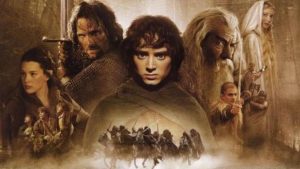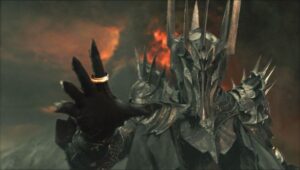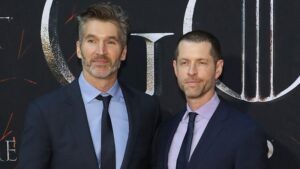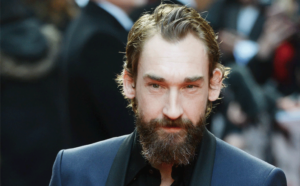As production begins on not one, but two seasons of Amazon Prime’s hugely ambitious prequel series to the classic novels of J.R.R. Tolkien, it can’t be long before the cast and characters are revealed to the public – so far, we only have four actors supposedly set to join the series’ ensemble cast, yet none of them have been officially confirmed by Amazon, and we still have no idea which characters (either from Tolkien’s expansive mythos or the showrunners’ imaginations) they might be playing. Today, though, some tantalizing new clues have leaked – not just about the holy quartet, as I’ve begun to call them, but also about a slew of new characters rumored to have prominent roles in the series. All of the following character names are presumably code-names put in place by Amazon to protect the secrets, and absolutely none of this is official.

Firstly, the obvious, or least, unsurprising. Markella Kavenagh is rumored to be playing the inquisitive teenager Tyra, who is wise beyond her years and all that. We met her in those leaked audition tapes from a while back, remember her? At this point I’d be very surprised if Kavenagh doesn’t end up playing the Tyra character, considering how strong the rumors are – we do have a new tidbit of information about her: she is suspected to be both a dramatic and a comedic character.
Will Poulter is rumored to be playing Beldor, something I suspected: Beldor, a young, politically savvy protagonist, seems like he could very well be the young Lord Elrond of Imladris. The new hints suggest that Beldor will be paired up with more dramatic characters who will provide a stark contrast to his reserved, perhaps even solemn nature. Yep, sounds like Elrond to me. If not, I suspect he’s probably Elrond’s mentor Gil-galad.
Game Of Thrones‘ Joseph Mawle is still rumored to be a central antagonist for the series, though this new report is beginning to confirm our suspicions that his character, Oren, is in fact the deceiver Sauron. A personality “built around a wounded and fallen nobility”, who projects “a sense of timelessness” – those are basically the hallmarks of the fallen demigod Sauron, who turned away from the wisdom of the gods and chose to walk a path of darkness into ruin. It’s unclear whether Mawle will also portray the Dark Lord in his form as the Elven lord Annatar, or whether the character will take many different guises during the series’ run.
The protagonist is rumored to be a woman, the character Eldien, whose description is particularly interesting. Yet another timeless character, Eldien is “complex, unique and formidable”. Who else is complex, unique and formidable? The Elven lady Galadriel, a battle-hardened leader and warrior whose morals are much more gray in the Second Age of Middle-earth than they were later on in her long life – at the time this series takes place, Galadriel, like Sauron, has just rejected the mercy of the benevolent gods and has turned away from their guidance to seek glory and fortune in Middle-earth. I would be very happy if the spotlight is on Galadriel for at least the first season.
Now we move into the rest of the ensemble cast, briefly but vividly sketched out: there’s Neldor, who’s a “similar archetype” as the similarly named Beldor – Elrond’s twin brother, Elros, perhaps?
We have Brac, a character who provides the other half of a dramatic duo – described as “irascible and cantankerous”, Brac’s description isn’t really ringing any bells for me. I suppose he could be somebody like King Oropher of the Wood Elves – in which case, it would be funny if the other half of the duo was Beldor (if Beldor is Gil-galad). The only description we have of Oropher from Tolkien’s own works is that he disobeyed Gil-galad’s orders to halt during the War of the Last Alliance and ended up being killed in a reckless charge at the gates of Barad-dûr. That’s a possibility, but it’s more probable that Brac is a completely invented character.
Eira is next on the list – “a warm and maternal woman”. There’s not much to go on here.
Aric, whom we encountered in the audition tapes, is still on board to be a main character – or at least a series regular. His character, a charismatic rogue, was very well defined in the leaked dialogue, so I don’t feel like there’s too much new material to go over. I’m beginning to guess that Maxim Baldry, the last rumored cast member, is playing this character (not for any particular reason: just because).
Calenon is a “ruggedly-handsome” war hero. He’s also described as “brooding”, which is never a fun character trait. But there is a prominent Tolkien character who does nothing but brood, and that’s Celeborn, the husband of Galadriel. That’s as good a guess as any. Plus, it would be amusing to see Celeborn as a handsome heartthrob, since by the time of The Lord Of The Rings, he, well, isn’t.
As if on cue, we come to Loda, the “earthy” fellow who “doesn’t give his feelings away easily”. Yet another boringly unoriginal trope. Earthiness suggests a human character, though perhaps not a Númenórean (they seem more like lofty, spiritualistic types): so let’s mark Loda down as a possible man, maybe even a Wose of the Woods.
Kari, the next character on the list, is a deserter from the nearest Dungeons & Dungeon campaign, it seems. A “self-sufficient single mother”, she would seem to fit the bill for the character of Erendis, the Second Age’s most iconic unique female character, if not for the fact that she’s a “village healer with a secret”. If we really want to believe she’s Erendis, we could come up with theories that Amazon Prime is changing the story so that the proud Númenórean queen flees to the countryside to be alone with her daughter and there becomes a rural medic, hiding the shocking secret that her daughter is the heiress to the throne – but it’s somewhat more plausible, in my opinion, that she’s playing Tyra’s mother.
Hamson is one of the weirdest names on the list – whereas most of the code-names are vaguely archaic in a watered-down sort of way, Hamson sounds more Old English; more like a certain Hamfast Gamgee of the Shire, right down to the character description as a “loving family man with health issues”. But Hamfast Gamgee wasn’t born in the Second Age, and wouldn’t be born until many thousands of years later, so unless there’s some extreme timeline-muddling going on here, I very much doubt this character is a Gamgee, or even a hobbit in general. Hobbits probably existed in some form or another during the Second Age, but nobody knew about them. To keep continuity with Tolkien’s writings, it would be best if hobbits never showed up in the Amazon Primes series, or only appeared in the story’s peripheries. But in that case, I can’t imagine what or who Hamson is, and what’s he doing in this story.
Finally, there’s Cole, another “charismatic” character: this time, one who carries “the weight of the world” on his shoulders. That could be literally anyone in the Second Age, but for some reason I’m locking in my guess that this character is Celebrimbor, the Elven craftsman who designed the Rings of Power in a desperate attempt to try and rebuild Middle-earth in the image of paradise. He literally carries that burden and responsibility with him until he get killed in a particularly brutal way by Sauron during the Dark Lord’s war against the Elves.
There’s a lot here that could potentially be interesting, even engrossing, when executed. On paper, some of these character descriptions are bound to look a little off-putting to Tolkien purists – brooding heroes, charismatic rogues – but it’s better not to get too freaked out about any of this right now. The series is still very early on in its development, and no footage has yet been shot. Some (or all) of this is susceptible to change. Nonetheless, it’s fun to theorize about these things and wonder what it means for the series.
What do you think of the code-names and character traits? Do you agree with my assessments? Share your thoughts and theories in the comments below!


